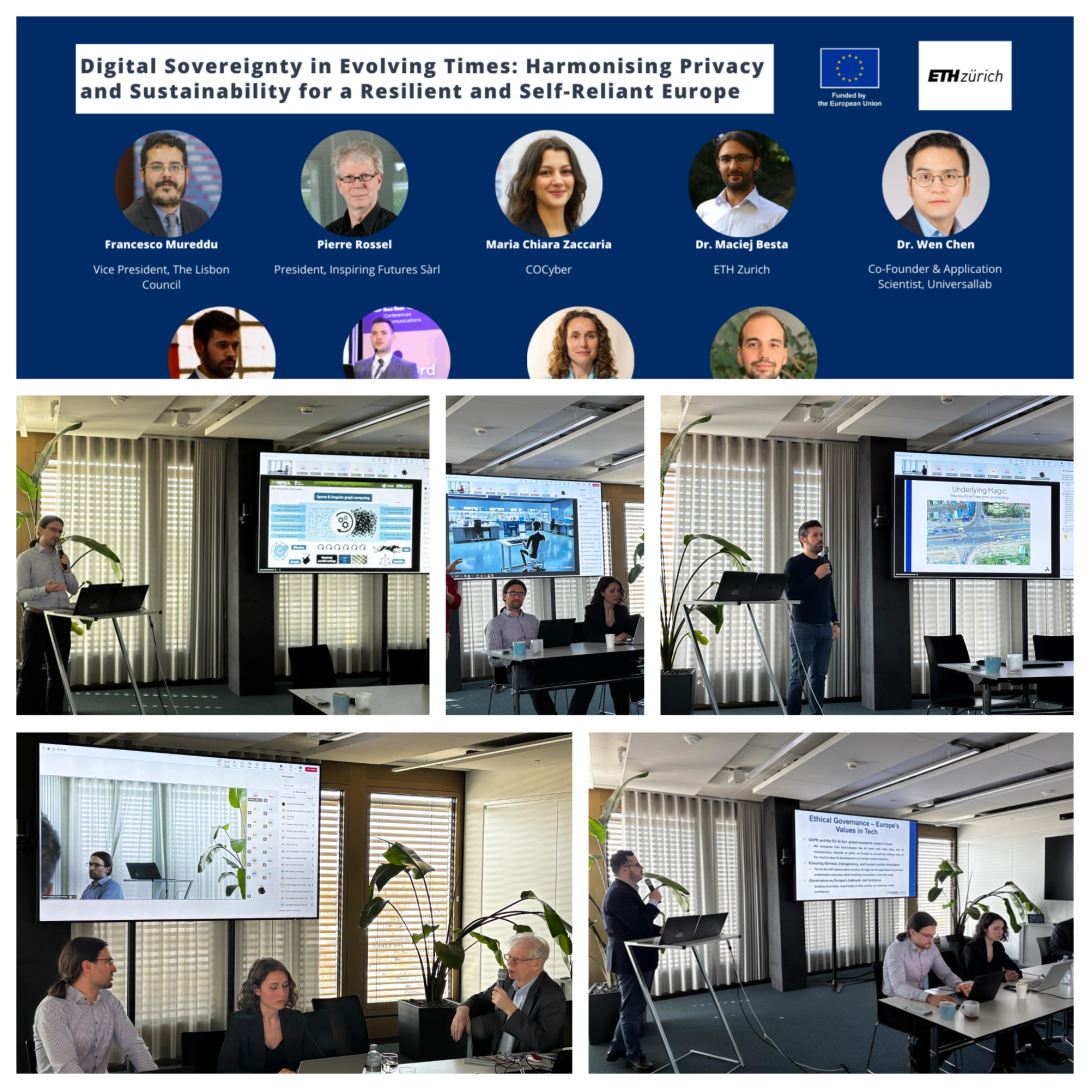
Zurich, 3 April 2025 – In the shadow of unprecedented geopolitical shifts, rapid technological transformation, and an accelerating climate crisis, the question of how Europe can remain digitally sovereign has never been more urgent. To confront this challenge head-on, the GLACIATION project convened a high-level dissemination event under the banner “Digital Sovereignty in Evolving Times: Harmonising Privacy and Sustainability for a Resilient and Self-Reliant Europe.”
Held in Zurich, the event brought together a diverse community of policymakers, researchers, technologists, and legal experts to explore how Europe can govern its digital ecosystem while upholding its ethical principles—focusing on the intersection of privacy, innovation, and sustainability.
Setting the Scene: Reframing Sovereignty for the Digital Age
The event opened with remarks that framed digital sovereignty as more than a buzzword—it is a modern imperative tied to strategic autonomy, technological self-reliance, and democratic governance. In Europe, these values form the backbone of an emerging framework that must remain resilient in the face of disruption.
GLACIATION’s approach exemplifies this vision: leveraging the cloud-edge continuum to keep data closer to its source, enhancing privacy protections, and reducing environmental impact through AI optimisation and metadata fabrics. This innovative model shows how Europe can lead by aligning sustainability with sovereignty.
The overall event was moderated by Alessia Colletta (MEF), whose thoughtful guidance ensured a coherent narrative across sessions and helped anchor the discussions in the broader policy landscape. The panel session itself was moderated by Mpampis Chatzimillas, who steered the conversation across legal, technical, and ethical dimensions with poise and precision.
Keynote Highlights: A Multifaceted Exploration of Sovereignty
The event featured six keynote speeches, each addressing a unique facet of digital sovereignty:
Pierre Rossel (Inspiring Futures Sàrl) delivered a powerful keynote on “The Power of Resilience: Thriving in an Uncertain World,” where he dissected the foundations of digital sovereignty and situated the conversation within the climate crisis and post-historical narratives, offering a sobering yet hopeful lens through which to understand the challenges ahead.
Francesco Mureddu (The Lisbon Council) offered a surgical analysis of digital sovereignty, arguing that it must be tackled alongside the climate agenda. He underscored the role of European R&I projects like GLACIATION as foundational for building a self-reliant, climate-conscious digital Europe.
Maria Chiara Zaccaria (The Lisbon Council) brought an incisive geopolitical perspective with her keynote “Trust in a Digital Europe.” She explored how civilian and military domains are increasingly blurred in cyberspace, adding complexity to the legal and ethical frameworks needed for European sovereignty.
Dr. Maciej Besta (ETH Zurich) introduced the audience to the concept of graphs of thought and their application in ethical AI. His presentation delved into how traceable graph paths enable states to understand and audit AI decision-making, reinforcing epistemic integrity and sovereignty through transparency and accountability.
Dr. Wen Chen (Universallab) explored how AI is reshaping scientific testing. Her talk connected material science, AI, and digital innovation, demonstrating how Europe can use frontier research to maintain sovereignty while advancing sustainable innovation.
Dr. Manos Barmpounakis (MobiLysis) delivered a live demonstration of mobility data technology. He spoke about the risks of foreign dependency on data infrastructure, and how home-grown digital tools—like those developed at MobiLysis—are critical for protecting Europe’s autonomy in smart transport and urban mobility.
Panel Discussion: Law, Technology, and Sovereignty in Fractured Times
The afternoon panel, titled “Digital Sovereignty in Fractured Times: Balancing Privacy, Sustainability, and Innovation,” expanded on the day’s themes through a dynamic exchange of ideas.
Mpampis Chatzimillas moderated the session, guiding a conversation that moved between technical, legal, and ethical domains.
A standout contribution came from Stergios Konstantinou (SGKLegal), a GDPR lawyer who provided essential legal context for sovereignty in the digital age. He emphasised that GDPR remains a cornerstone of European digital governance, even as nations navigate new pressures. Critically, he highlighted the growing use of national security exemptions to override GDPR protections—raising important questions about rule of law, data protection, and cross-border coherence in a geopolitically unstable world.
The panel also featured:
- Dr. Maciej Besta, who elaborated on how graph intelligence can serve as a foundation for sovereign AI systems.
- Dr. Manos Barmpounakis, who reflected on the strategic importance of mobility data and urban digital infrastructure.
Together, the panellists explored how Europe can move beyond reactive policymaking and proactively shape digital governance aligned with its values.
Conclusion and Networking
The event closed with a wrap-up by Dr. Maciej Besta, who summarised the key insights and reaffirmed the role of research and innovation in building a resilient and ethically guided digital future for Europe.
The final networking session allowed participants to connect more deeply, explore collaborations, and engage with GLACIATION's poster presentations, showcasing the project's technical components and early results.
Looking Ahead
As digital sovereignty becomes a defining feature of 21st-century geopolitics, events like these offer a crucial forum for debate, alignment, and action. Through thoughtful dialogue and cross-sector collaboration, GLACIATION is helping to build the next-generation infrastructure for a sovereign, sustainable, and democratic European digital ecosystem.
Stay tuned as we continue to share video recordings, speaker highlights, and upcoming insights from the project. Watch the full recording HERE